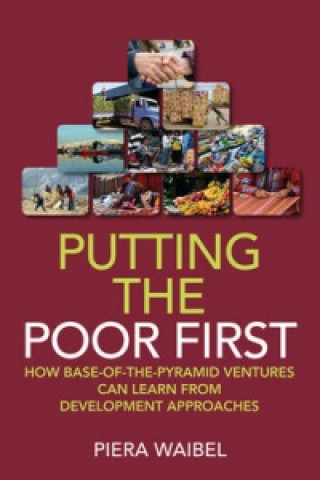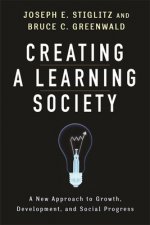
Kód: 02096621
Putting the Poor First
Autor Piera Waibel
In order to make progress toward the UN Millennium Development Goals - and particularly in terms of poverty alleviation - business has a pivotal role to play: in terms of core business; purchasing products from the poor; employing ... celý popis
- Jazyk:
 Angličtina
Angličtina - Vazba: Pevná
- Počet stran: 244
Nakladatelství: Taylor & Francis Ltd, 2012
- Více informací o knize

Mohlo by se vám také líbit
-

Freedom and the Court
1167 Kč -

Principles of Hotel Front Office Operations
3256 Kč -

Fun Stuff and Other Essays
554 Kč -

Mass and Rubrics of the Roman Catholic Church - Scholar's Choice Edition
732 Kč -

River of Life and Other Stories
537 Kč -

Critical Care Nursing Made Incredibly Easy!
1401 Kč -

Pohádky pro malé Buddhy
253 Kč
Darujte tuto knihu ještě dnes
- Objednejte knihu a zvolte Zaslat jako dárek.
- Obratem obdržíte darovací poukaz na knihu, který můžete ihned předat obdarovanému.
- Knihu zašleme na adresu obdarovaného, o nic se nestaráte.
Více informací o knize Putting the Poor First
Nákupem získáte 193 bodů
 Anotace knihy
Anotace knihy
In order to make progress toward the UN Millennium Development Goals - and particularly in terms of poverty alleviation - business has a pivotal role to play: in terms of core business; purchasing products from the poor; employing them; and selling them affordable services and products. Serving the global 4 billion people at the base of the economic ladder - the Base of the Pyramid (BoP) - with suitable products and services is a new but growing field in research and practice. In the initial years, the focus of BoP was very much on selling products and services to a huge untapped market. Practitioners and academics focused on developing new distribution channels to reach the low-income markets and new technological solutions to address their needs. These first-generation "fortune-finding" approaches are now described as "business to four billion". Over the last few years, however, new priorities have gained prominence. This new value proposition can be framed as "business with four billion" and is "fortune-creating". So-called Next Generation, or BoP 2.0, strategies can bring companies and their target groups closer together. The goal is to co-create new business models as well as product and service solutions together with the target group. Integrating BoP into the innovation process - be it in terms of idea generation, product/service development, production or distribution/marketing - is seen as way to increase not only the impact on poverty alleviation, but also the benefits to the company. This paradigm shift - to co-creation or embedded innovation - in fact closely mirrors a shift previously made by development researchers who argued that the poor should no longer be viewed as the target of poverty reduction efforts, but as partners in, and an asset to, the development process. Bottom-up development approaches - such as Participation, Community-Driven Development, Empowerment, Asset-Based Community Development or Local Knowledge - emphasise the role of the poor and see them as central to the design and implementation of the development process. Even though some BoP researchers consider selective parts of this knowledge in their research, a comprehensive study that rigorously examines BoP ventures from a bottom-up development perspective has not yet been completed. This book attempts to fill that gap. Putting the Poor First examines the applicability of different elements in the bottom-up development literature to the innovation process of BoP ventures. It unveils connections between the two approaches and builds a theoretical base for the case study research. With three in-depth case studies and eight companies participating in a survey, the current state and experiences of businesses applying a bottom-up development perspective with BoP ventures in Latin America and the Caribbean is analysed. The elements of a bottom-up development perspective applied in BoP practice can be grouped into three categories: drivers for choosing a bottom-up development perspective in BoP ventures (e.g. such that products and services are more readily accepted); circumstances that help or hinder the application of a bottom-up development perspective in BoP ventures (e.g. the acceptance of the company by communities or previous experiences with poverty alleviation projects); and success factors when choosing a bottom-up development perspective in BoP ventures (e.g. the importance of power structures, pluralism and self-esteem). The many recommendations, such as empowering the poor by encouraging co-creation and outsourcing innovation, fill gaps in theory, support practitioners and lay the foundations for further research. This will be a key book for BoP researchers and practitioners on the ground. The reconnection of development approaches with BoP strategies puts the poor first.
 Parametry knihy
Parametry knihy
Zařazení knihy Knihy v angličtině Reference, information & interdisciplinary subjects Interdisciplinary studies Development studies
1927 Kč
- Plný název: Putting the Poor First
- Autor: Piera Waibel
- Jazyk:
 Angličtina
Angličtina - Vazba: Pevná
- Počet stran: 244
- EAN: 9781906093747
- ISBN: 1906093741
- ID: 02096621
- Nakladatelství: Taylor & Francis Ltd
- Hmotnost: 510 g
- Rozměry: 239 × 163 × 19 mm
- Datum vydání: 01. October 2012
Oblíbené z jiného soudku
-

Creating a Learning Society
714 Kč -

Measure of Civilization
632 Kč -

Leading the Sustainable Organization
1792 Kč -

Bottom Billion
346 Kč -

Development: A Very Short Introduction
249 Kč -

Challenge for Africa
303 Kč -

Agroecology
970 Kč -

Degrowth
1415 Kč -

Economic Development
410 Kč -

Silenced Rivers
2003 Kč -

Emerging Africa
303 Kč -

Regenerative Design for Sustainable Development
2616 Kč -

Social Entrepreneurship as Sustainable Development
2126 Kč -

Museums, Heritage and International Development
6077 Kč -

Development Theory
1164 Kč -

Oxford Handbook of Economic Inequality
1866 Kč -

Socio-Economic Development
2096 Kč -

Mediatized China-Africa Relations
3313 Kč -

Social and Solidarity Economy
2970 Kč -

Food Security, Nutrition and Sustainability
1641 Kč -

Collaboration for Sustainability and Innovation: A Role For Sustainability Driven by the Global South?
3313 Kč -

Participation
1383 Kč -

Power and Participatory Development
945 Kč -

Social Development and Political Change in Hong Kong
1182 Kč -

Designing and Building Mini and Micro Hydro Power Schemes
1551 Kč -

Hornblower's Historical Shipmates
1298 Kč -

Colombia
1298 Kč -

Building with Lime Stabilized Soil
2931 Kč -

After the Conflict
1649 Kč -

Understanding Sustainable Development
1550 Kč -

Regional Governance and Policy-Making in South America
2126 Kč -

Cuba and Its Neighbours
1024 Kč -

Globalisation, Economic Development & the Role of the State
1383 Kč -

Food, National Identity and Nationalism
2651 Kč -

New Scramble for Africa 2e
2396 Kč -

Theories and Practices of Development
1430 Kč -

Action and Knowledge
2200 Kč -

Why Doesn't Microfinance Work?
1121 Kč -

Global Capital, National State and the Politics of Money
3362 Kč -

Is Good Governance Good for Development?
1774 Kč -

Economic Analysis of Environmental Impacts
2042 Kč -

Theories of Development
1681 Kč -

Records of Oman 1867-1960 12 Volume Hardback Set Including Map Box
116296 Kč -

Oxford Handbook of Global Studies
5225 Kč -

Companion to Development Studies
4266 Kč -

Participation
1579 Kč -

Sustainable Governance of Wildlife and Community-Based Natural Resource Management
1641 Kč -

Manual of Building Construction
2056 Kč -

Senegal
517 Kč
Osobní odběr Praha, Brno a 12903 dalších
Copyright ©2008-24 nejlevnejsi-knihy.cz Všechna práva vyhrazenaSoukromíCookies



 Vrácení do měsíce
Vrácení do měsíce 571 999 099 (8-15.30h)
571 999 099 (8-15.30h)